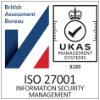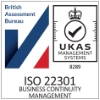Customer Overview
Aspia Space is an innovative UK-based startup specialising in geospatial analytics and Earth observation technologies. Operating in the Geospatial Intelligence and Remote Sensing sector, Aspia supports both public and private sector clients. As an early-stage company with high-growth potential, it forms part of the UK’s expanding space and AI technology ecosystem.
Challenge
Aspia’s primary challenge was to build a secure, scalable environment for processing satellite data derived from Synthetic Aperture Radar (SAR). While the organisation is not bound by formal compliance mandates, the processed imagery it generates constitutes valuable intellectual property and a critical business asset. Without strong cloud security controls, Aspia risked data leakage, unauthorised access, or downtime—any of which could erode stakeholder confidence and hinder commercial growth.
In addition, Aspia required an end-to-end data platform to ingest, process, and deliver geospatial datasets—integrating with existing machine learning pipelines and delivering insights through secure workflows.
Approach
The engagement was designed to meet Aspia’s need for both security and speed. Cloudscaler structured delivery across two focused workstreams. The first centred on securing the cloud platform and implementing foundational security architecture using AWS-native tools. This included identity and access management, logging, encryption, and real-time threat monitoring—with all components delivered as Infrastructure-as-Code.
The second workstream focused on enabling the data platform. Aspia required a centralised analytics environment capable of delivering curated views of geospatial data to customers—supporting real-time querying and consumption through intuitive, customer-facing dashboards.
Solution
At the heart of the solution was Cloudscaler’s Enhanced Landing Zone (ELZ), which provided the secure cloud foundation for Aspia’s environment. Built to complement AWS’s Landing Zone Accelerator, the ELZ delivers essential security, networking, and compliance features out of the box—accelerating time-to-value and reducing delivery risk. For high-growth startups like Aspia, it offered a robust starting point and a clear path to operational maturity, enabling teams to build confidently from day one.
Cloudscaler deployed a comprehensive suite of AWS-native security tools to enforce access control, ensure audit visibility, and automate compliance. AWS IAM Identity Center was used to establish federated, role-based access for development and operations teams, with short-lived credentials and enforced multi-factor authentication. IAM roles and policies were defined using source-controlled YAML configurations and deployed through the ELZ, ensuring scalable and auditable access management aligned with GitOps principles. IAM Access Analyzer identified overly broad permissions, while GuardDuty and Security Hub provided real-time insights into access patterns and potential threats.
Following the successful deployment of the ELZ, Cloudscaler delivered a streamlined MVP for Aspia’s data platform, tailored to immediate operational goals. Built with AWS Glue, the platform ingested and transformed data from existing machine learning pipelines, enabling fast, scalable analysis with Amazon Redshift Serverless and real-time responsiveness powered by S3 event triggers. Infrastructure and workflows were fully automated using Terraform, with all configurations source-controlled in a dedicated GitHub repository within Aspia’s organisation. Cloudscaler also implemented CI/CD pipelines to deploy changes seamlessly into AWS environments provisioned by the ELZ—enabling consistent, repeatable deployments with minimal manual intervention.
The solution delivered by Cloudscaler gave Aspia Space a secure, scalable environment to accelerate both platform development and customer delivery.
Outcomes
Aspia was able to confidently scale its infrastructure without delays caused by risk mitigation. Development teams now operate within a clearly defined security perimeter, using Infrastructure-as-Code pipelines that embed auditability and compliance checks into every deployment.
On the data side, Aspia now has a robust data platform that provides a solid foundation for future production systems. Geospatial data can be ingested, processed, and delivered to customers more quickly and efficiently. With AWS Glue, Redshift Serverless, and automated event triggers, the platform supports end-to-end data movement with minimal manual input.
The environment is cloud-native, cost-optimised, and extensible—ensuring future security enhancements or data integrations can be delivered seamlessly. This capability has enabled Aspia to accelerate its roadmap, improve operational confidence, and strengthen its position with investors, partners, and prospective clients.
Value Delivered
For a fast-growing startup in the high-stakes geospatial intelligence sector, the ability to move quickly without compromising data protection is critical. This engagement enabled Aspia to do exactly that. By embedding strong, automated security practices from day one and combining them with a lightweight, event-driven data platform, Cloudscaler helped Aspia scale with confidence. Crucially, all of this was achieved while remaining cost-conscious—balancing technical ambition with commercial pragmatism.
“Aspia needed to move fast — but without compromising on trust. By deploying our Enhanced Landing Zone and a secure, automated data platform, we gave them a launchpad to scale with confidence. This is exactly what modern startups need: guardrails, not gates — so they can build safely, without slowing down.”— Andy Astley, CTO, Cloudscaler






